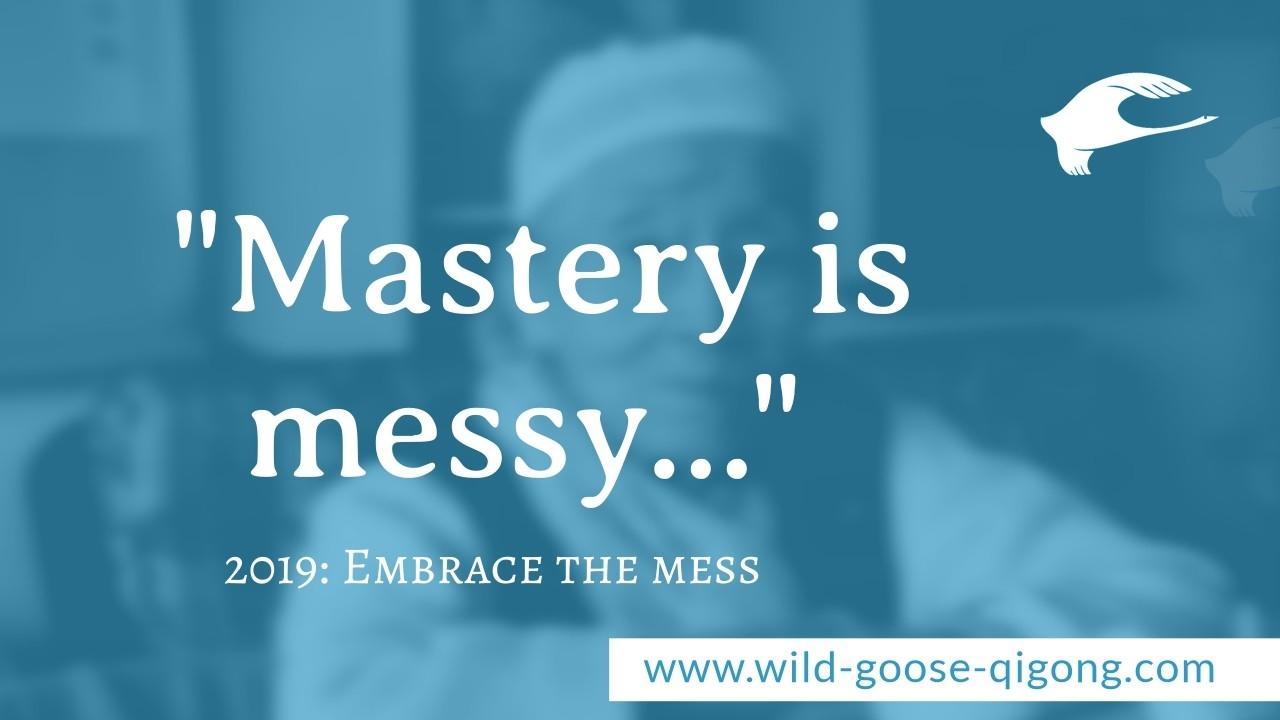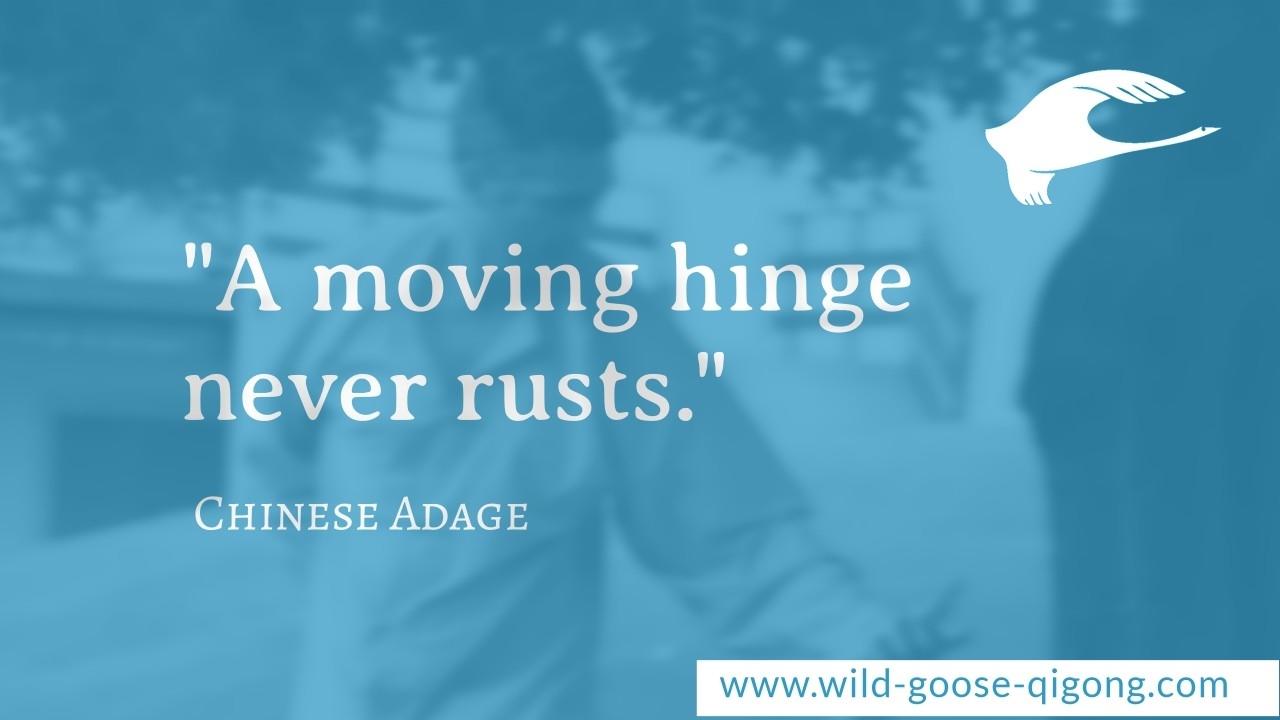Lesson from the Mountain

A short lesson from the mountain...
Each year, around March / April, I go stay in a hut up a hill to find some quietude, inside and out :) This time, I planned a lot of Jing Gong, some Dong Gong, and in between reading & writing. 4 days away which, as a home-schooling Dad and husband, was a long time from the 'red dust'* of real life.
The hut is only accessible by foot. A steep winding path ascends through native woods, and brings you out to a ridge clearing, where the hut looks out down the great Wangapeka River Valley. It’s an awesome spot.
On a still days, you can just hear the river deep below, and pines sifting the breeze.
But my quietude was soon disturbed.
I had the company of at least two nocturnal residents: (at least) one rat in the wall and roof space, and (at least) one possum jumping and squealing around on the tin roof.
So, late on my third day, faced with a third night of broken sleep, and came down from the hut…
I did manage some long periods of meditati...
"The Ordinary is the Extraordinary"

"The ordinary is the extraordinary" [Wang Xiang-Zhai, Qigong Master, 1885 - 1963]
These 5 words teach a powerful principle.
The principle applies to all areas of life not just the practice of Qigong, Yang Sheng / Nourishing Life (養生) or the Martial Arts. Let me expand a little: extra-ordinary levels of skill or success are achieved through consistent, deliberate practice of ordinary actions.
Fei Bo-Xiong, a Chinese Doctor writing in 1863, helps us to grasp this principle further: "There exist no miraculous methods in the world, only plain ones, and the perfection of the plain is miraculous."
The modern-day Self Development guru Jim Rohn shared a similar belief: "Success is neither magical nor mysterious. Success is the natural consequence of consistently applying the basic fundamentals."
But what are these ordinary actions? What are the fundamentals that we are to perfect?
Within the Wild Goose Qigong system, our fundamentals are essentially these two things: Dong Gong (moving ex...
Wild Goose Qigong 2019 - Year of the Pig

Happy New Year!
We’re now 7 days into 2019. Actually, I’m more of a Chinese New Year kind person [February 5th - Year of the Pig]. Somehow it just feels more auspicious. I especially adore the Lantern Festival. Between now and then is that short window of time when we seek self-renewal and reset our inner compass - better health, relationships, productivity etc. All ‘resolutions’ and goals come down to a simple yet complex truth: stop doing what you know is bad for you and do more of what’s good. Change comes from within and requires us to take new action. Otherwise, we keep doing what we've been doing, with the same results. Simple is rarely easy, however. We, humans, are complex beings. Common sense is not always common practice. But what if there was just ONE thing, one new habit, that if followed, could make manifold changes?
Here’s what I’ve noticed over my 19 years of Wild Goose Qigong practice - especially these last 2 years whilst emigrating -: whenever I feel like I’m c...
Wild Goose Qigong Blog - "A Moving Hinge Never Rusts"

“A moving hinge never rusts”
This ancient Chinese adage appears in the biography of the Daoist physician Hua Tuo c. 200. It also appears in this interpretation: “A [wooden] hinge is not eaten by woodworm” and often coupled with the phrase, "Flowing water does not stagnate [go mouldy].”
The Daoists have a wonderful way of observing natural processes and applying them, either directly or metaphorically, to the human condition. And this quote is probably one of my favourites.
Movement, like regular Qigong practice, lubricates the joints, moves the blood and Qi, strengthens the bones and soft tissues. Gentle physical exercise can reduce oxidative stress in the brain and body. Physical overexertion, on the other hand, can increase oxidation (‘rusting’).
The simple advice is: move.
But we can take the image of the hinge a step further: after movement (or transition) there is rest. But rest is not inactive. Rest is not redundant. After all, when still, the hinges still hold up the ...
Grandmaster Yang Mei June on 正 (Uprightness), 准 (Accuracy), 实 (Honesty),
Grandmaster Yang Mei June (1895 - 2002)
27th Generation Inheritor of the Kunlun Dayan Qigong System
—
Hello Master Yang,
You've been invited here by the Guangdong Qigong Association and the Qigong & Martial Arts Association of Southern Medical University. You travelled here from Wuhan to teach students for our workshop. Can you tell us something about Dayan Qigong? How did it come about?
Dayan Qigong dates back to the Jin Dynasty [266-420 CE]. It originates from the Daoist Kunlun School [Kunlun Mountains]. According to its teaching, Dayan Qigong can only pass down to one person each generation. Now, it has evolved over dozens of generations [28]
When did you start to learn Qigong?
Wild Goose Qigong Training Video - 1st 64, #56
What do you give a 106-year-old Qigong Grandmaster?

What do you give a 106-year-old Qigong Grandmaster?
That was the question I was asking myself in May of 2002, before my journey to visit Yang Mei June, 27th Generation Grandmaster of the Kunlun Da Yan Qigong System. I wanted to carry with me something from Scotland. But what do you gift to such a woman?
A week later in Beijing I unpacked my rucksack. They had made it through:
A blooming root of purple mountain heather, picked from the summit of a Scottish munroe. Its root wrapped in moist tissue and then again in foil. And a stone. Gneiss. Washed and tumbled by the sea, off the coast of Arbroath, for ages, into a perfect egg shape. Mountain & Sea.
“It’s heavy!” commented Yang Mei June, taking it in her hand. The stone filled her palm. The gneiss - 3 billion years old - predating all life on earth. Her skin so thin, paper-like, transparent, without age spots.
The purple blooming heather made its way into an oversized plant pot. Filled with soil from a nearby building site. It laste...
The late Grandmaster Yang Mei June (d. 23 July 2002, aged 106)
Meeting the Grandmaster...
At 106 years of age, Yang Mei June had to be carried to the dinner table. I sat opposite her. Her body was frail. But her voice and spirit were strong. This diminutive lady – under 5 foot tall - had the most incredible story...
Yang Mei June was born at the end of the Qing Dynasty (1644 -1912). She only narrowly survived the Sino-Japanese War (1937–1945) by pretending she was dead, being consequently buried alive and later digging her way out. She later survived persecution during the Cultural Revolution (1966 –1976). What made her survival more crucial, was that Yang Mei June was the 27th Grandmaster of the Da Yan (Wild Goose) Qigong system. She was highly respected in the Qigong and Internal Martial Arts circles.
After the violence of the Cultural Revolution, Yang Mei June decided to go against tradition and open this skill to the public for the well-being of everyone. Students came to her from far and wide, for she, and only she, held the accumulative k...

